高职高专实用英语Unit1_Text_A
- 格式:ppt
- 大小:444.00 KB
- 文档页数:34
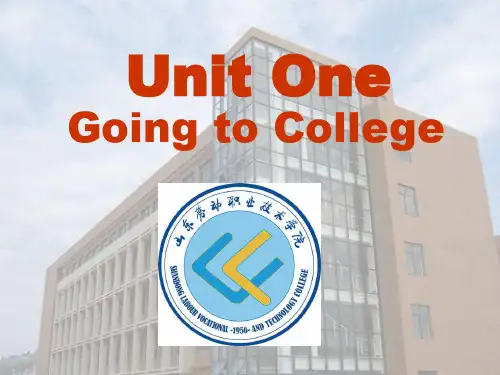
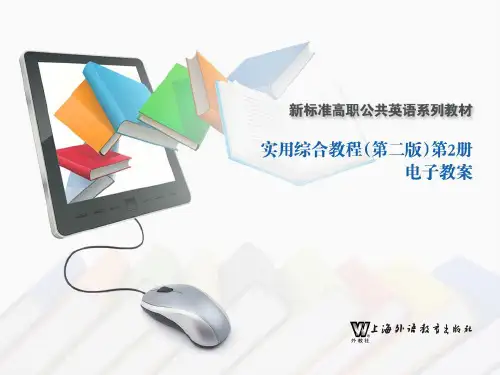
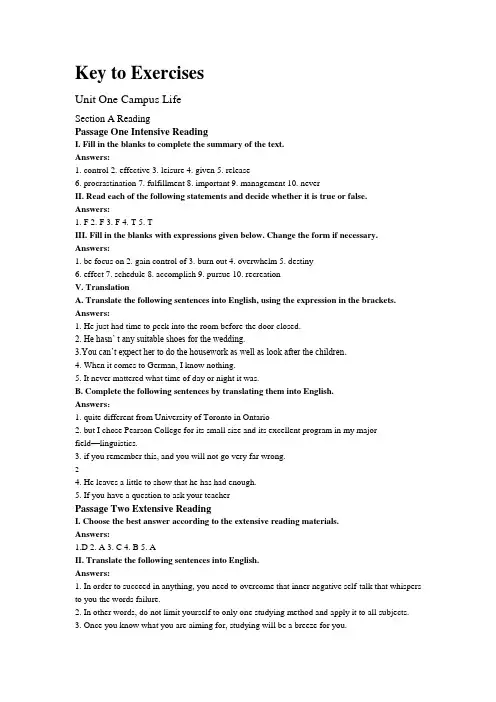
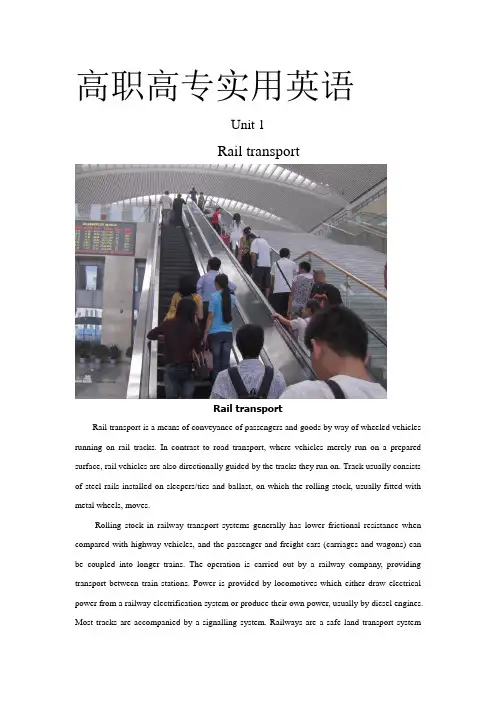
高职高专实用英语Unit 1Rail transportRail transportRail transport is a means of conveyance of passengers and goods by way of wheeled vehicles running on rail tracks. In contrast to road transport, where vehicles merely run on a prepared surface, rail vehicles are also directionally guided by the tracks they run on. Track usually consists of steel rails installed on sleepers/ties and ballast, on which the rolling stock, usually fitted with metal wheels, moves.Rolling stock in railway transport systems generally has lower frictional resistance when compared with highway vehicles, and the passenger and freight cars (carriages and wagons) can be coupled into longer trains. The operation is carried out by a railway company, providing transport between train stations. Power is provided by locomotives which either draw electrical power from a railway electrification system or produce their own power, usually by diesel engines. Most tracks are accompanied by a signalling system. Railways are a safe land transport systemwhen compared to other forms of transport. Railway transport is capable of high levels of passenger and cargo utilization and energy efficiency.The oldest, man-hauled railways date to the 6th century B.C. With the British development of the steam engine, it was possible to construct mainline railways, which were a key component of the industrial revolution. Also, railways reduced the costs of shipping, and allowed for fewer lost goods. The change from canals to railways allowed for "national markets" in which prices varied very little from city to city. Studies have shown that the invention and development of the railway in Europe was one of the most important technological inventions of the late 19th century. In the 1880s, electrified trains were introduced. Starting during the 1940s, the railways in most countries had their steam locomotives replaced by diesel-electric locomotives, with the process being almost complete by 2000. During the 1960s, electrified high-speed railway systems were introduced in Japan and a few other countries.译文铁路运输铁路运输是一种通过在铁路轨道上行驶的轮式车辆运输旅客和货物的方式。
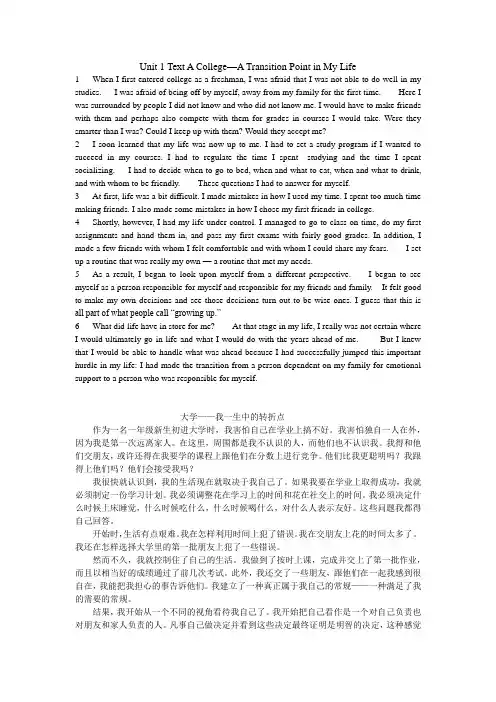
Unit 1 Text A College—A Transition Point in My Life1 When I first entered college as a freshman, I was afraid that I was not able to do well in my studies. I was afraid of being off by myself, away from my family for the first time. Here I was surrounded by people I did not know and who did not know me. I would have to make friends with them and perhaps also compete with them for grades in courses I would take. Were they smarter than I was? Could I keep up with them? Would they accept me?2 I soon learned that my life was now up to me. I had to set a study program if I wanted to succeed in my courses. I had to regulate the time I spent studying and the time I spent socializing. I had to decide when to go to bed, when and what to eat, when and what to drink, and with whom to be friendly. These questions I had to answer for myself.3 At first, life was a bit difficult. I made mistakes in how I used my time. I spent too much time making friends. I also made some mistakes in how I chose my first friends in college.4 Shortly, however, I had my life under control. I managed to go to class on time, do my first assignments and hand them in, and pass my first exams with fairly good grades. In addition, I made a few friends with whom I felt comfortable and with whom I could share my fears. I set up a routine that was really my own — a routine that met my needs.5 As a result, I began to look upon myself from a different perspective. I began to see myself as a person responsible for myself and responsible for my friends and family. It felt good to make my own decisions and see those decisions turn out to be wise ones. I guess that this is all part of what people call “growing up.”6 What did life have in store for me? At that stage in my life, I really was not certain whereI would ultimately go in life and what I would do with the years ahead of me. But I knew that I would be able to handle what was ahead because I had successfully jumped this important hurdle in my life: I had made the transition from a person dependent on my family for emotional support to a person who was responsible for myself.大学——我一生中的转折点作为一名一年级新生初进大学时,我害怕自己在学业上搞不好。
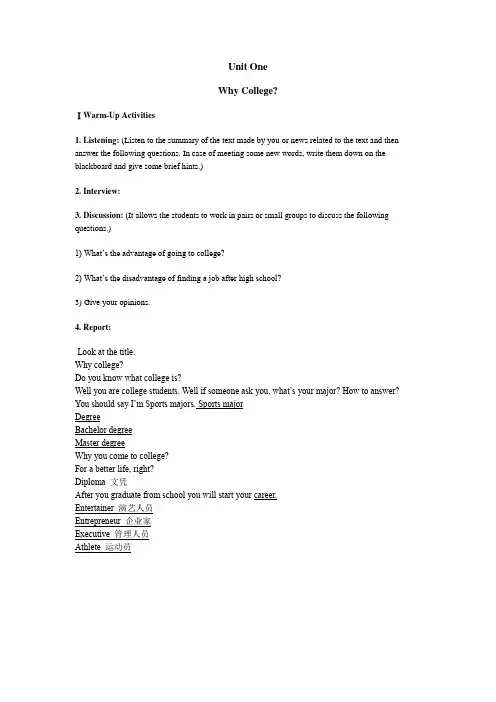
Unit OneWhy College?ⅠWarm-Up Activities1. Listening: (Listen to the summary of the text made by you or news related to the text and then answer the following questions. In case of meeting some new words, write them down on the blackboard and give some brief hints.)2. Interview:3. Discussion: (It allows the students to work in pairs or small groups to discuss the following questions.)1) What’s the advantage of going to college?2) What’s the disadvantage of finding a job after high school?3) Give your opinions.4. Report:Look at the title.Why college?Do you know what college is?Well you are college students. Well if someone ask you, what’s your major? How to answer? You should say I’m Sports majors. Sports majorDegreeBachelor degreeMaster degreeWhy you come to college?For a better life, right?Diploma 文凭After you graduate from school you will start your career.Entertainer 演艺人员Entrepreneur 企业家Executive 管理人员Athlete 运动员ⅡVocabulary StudyRead and explain some useful words or phrases.o advanced:e.g. Most people find her advanced ideas difficult to accept.o beyond: outside the range ofe.g. The car is beyond repair.------ Can you give me a hand?_____ Sorry, it is beyond me.o dominate: v. have power and control overe.g. Much of my spare time seems to be dominated by housework.Sports, and not learning, seem to dominate at that school.o entertainer:eraser, erector, director, computer, weedier, viewer, and so on.o faith: (in)e.g. Have you any faith in what he says?o major: n. chief subject at collegee.g. Business English is my major at college.adj. chief or importante.g. Guangzhou is one of the major cities of China.v. specialize ine.g. He majored in two subjects at CambridgeUniversity.o outearn: v. earn more thane.g. Tom outearns his father.out: surpassinge.g. outgo, outgrow, outlook, outliveo view:v. see or regard or think ofe.g. We will go and view the house before we buy it. ( inspect)He was viewed as the best candidate for this fob. (think of sb. as)II. Text Presentation and Language Points1. The more you learn, the more you earn.This is a structure used to show that two things happen together.Examples:A. The more practice you have, the fewer mistakes you will make.B. We'll have to begin our journey early tomorrow; in fact, the earlier, the better.C. Actually, the busier he is, the happier he feels.D. The more I read the poem, the more I understood it.2 .... as she accepted her high school diploma.diploma: a certificate of graduation from a school or collegeExamples:A. He received a diploma from Harvard in 1978.B. She worked hard to earn her music diploma.3. Although Cyndi made it without a high school degree, most people don't.make it: be successful (in one's career, etc.)Examples:A. He failed to make it as a writer.B. It's hard to make it to the top in show business.4. In the U.S.A. today, about 75% of jobs require some education or technical training beyond high school degrees; college graduates outearn those without a college education;...1) require: needExamples:A. What do you require of me?B. They required me to be quiet.C. It is required that the instrument should be tested before it is actually used.2) beyond: outside the range ofExamples:A. The car is beyond repair.B. Your work is beyond all praise.C. They're paying $100,000 for a small flat it's beyond belief.3) outearn: earn more thanExample:Tom outearns his father.4) out-: to a greater extent; surpassing, such as outdo, outlive, outnumberExamples:A. Jim outlived his wife by five years.B. John was unable to outdo his elder brother at tennis.C. The teenager outgrew his shoes in four months.D. Our army outnumbered the enemy's troops.5. Many skilled blue-collar workers, salespeople, business executives, and entrepreneurs outearn college professors and scientific researchers.executive: person or group in a business organization with administrative or managerial powers Example:I would like to apply for the position of sales executive.Lines 13 176. But a college education is not only preparation for a career; it is also (or should be) preparation for life.career: job or professionExamples:A. People choose their careers for many reasons.B. A r6sum6 always includes a description of your career objectives.7. In addition to courses in their major field of study, most students have time to take elective courses.1) in addition to: as well as; besidesExamples:A. In addition to giving a general introduction to computers, the course also provides practical training.B. We saw a Mickey Mouse cartoon, in addition to the cowboy movie.2) major as an adjective: greater or more importantExample:A. Cigarette smoking is a major factor contributing to cancer.B. Chicago is one of the major cities of the United States.major as a noun: a chief or special subject at a universityExample:She chose economics as her major.major in: specialize in (a certain subject) at college or universityExample:Helen majored in two subjects at the University of Maryland.8 .... or whatever else interests them.whatever: (used as pronoun or adjective)Examples:A. Whatever happens, don't forget to write to me.B. You can take whatever book you like on the bookshelf.9. But recent high school graduates no longer dominate the college campuses.1) graduate as a noun: person who has completed a course at a college, school, etc.Example:College graduates in China are now-ready to accept lower-paid jobs.graduate as a verb: complete an educational courseExample:He graduated from Oxford ten years ago.2) dominate: have power and control overExamples:A. He completely dominated the group and made all the decisions.B. Thanks to his strong personality, John dominated the new committee.3) campus: the grounds of a school, college or universityExamples:A. Freshmen are required to live on campus.B. The Princeton campus has developed into one of the most attractive in the country.10. Serving this great variety of people are about 3,400 colleges and universities enrolling more than 12 million students.variety: different kinds ofExamples:A. The electronics department had a wide variety of radios.B. There is quite a variety of food on the buffet table.11. American faith in the value of education is shown by this rising number of Americans who have at least a bachelor's degree.faith: strong belief inExamples:A. Have you any faith in what he says?B. I haven't much faith in the medicine.12. In the U.S.A., a college education is not viewed as a privilege reserved for the wealthy or the academically talented.1) view.., as: consider sb. or sth. in a certain wayExamples:A. I view John as a reliable colleague.B. John views his office as a dungeon.2) ) privilege: special fight given to a personExamples:A. The wealthy seem to have a great many privileges.B. Diplomats enjoy a lot of privileges in foreign countries.3) reserve: keep for a special purpose; make a reservation; and reserved is often used as adjective, meaning unwilling to express oneself freely or kept for special use.Examples:A. We'll reserve the room for you till noon tomorrow.B. The first three rows of the hall are reserved for special guests.C. I have reserved a table for two at the restaurant.D. Sorry, we haven't a reserved table.E. Jane is a shy, reserved girl.4) talent: special natural ability or skill; and talented is adjectiveExamples:A. He has a talent for drawing.B. This university aims at helping young people develop their talents.C. Yao Ming'is a highly talented basketball player.talented: having or showing talent; giftedExample:He was a very talented architect.V. Summary of the TextBetter education usually means higher incomes, although this may not always be the casein our life. In America today, more and more people, in spite of their differences in age, go to college also for career advancement or personal growth. The fact that America has got amuch higher percentage of people with college degrees than most other major countries in the world is proof of American faith in the value of education and equal rights for education in theU.S.Word reviewLet’s have a review of what we have learned.ReviewThree fundamental sentence patterns1) be eg: I am a boy2) There be: Three are 70 students in our class.3)He studied English.He studied English hard in the university for the test on Sunday.He studied English on Sunday.He studied English in the University on Sunday.He studied English hard.He studied English for the test.OutearnTom outearned his father last year.GraduateHe graduates from Oxford ten years agoDominateJohn dominated the new committee, thanks to his strong personality.He completely dominated the group and made all the decision.ReserveWe’ll reserve the room for you till noon tomorrow.The first three rows are reserved for special guests.We reserved the first three rows for special guests.I have reserved a table for two at the restaurant.ReservedJane is a shy, reserved girl.RequireWhat do you require of me? Require sth of sbThey required me to be quiet. Require sb to do sthIt is required that the instrument should be tested before it is actually used.It is required that…Made itHe failed to make it as a writerIt’s hard to make it to the top in show business.In addition toIn addition to the cowboy movie, we saw a Mickey Mouse cartoon.View… asI view john as a reliable colleague.John views his office as heaven.3. Read the text again and answer my questionGrammarHomework英语冠词专项练习题:1. I read ______story. It is ______interesting story.A. a, anB. a, aC. the, theD. /, an2. Britain is __ European country and China is ___ Asian country.A. an, anB. a, aC. a, anD. an, a3. ______China is _____ old country with _____ long history.A. The, an, aB. The, a, aC. /, an, theD. /, an, a4. _____elephant is bigger than ______ horse.A. /, /B. an, aC. An, aD. /, the5. We always have ______rice for ______lunch.A. /, /B. the, /C. /, aD. the, the6. It took me ______ hour and _____ half to finish ______ work.A. a, a, aB. an, a, aC. an, a, theD. an, a, /7. ______ doctor told me to take ______ medicine three times______day, stay in _____bed, then I would be better soon.A. /, a, a, theB. A, the, the, /C. The, the, a, /D. A, /, a, /8. There is ____ picture on ____ wall. I like ____ picture very much.A. a, the, theB. a, the, aC. the, a, aD. a, an, the9. January is ______first month of the year.A. aB. /C. anD. the10. Shut _____door, please.A. aB. anC. theD./11. Einstein won _____ Nobel Prize in Physics in 1921.A. aB. anC. theD. /12. What ____ fine day it is today! Let's go to the Summer Palace.A. aB. anC. theD. /13. I like music, but I don't like ____ music of that TV play.A. aB. anC. theD. /14. ____ girl over there is ____ English teacher.A. The, anB. A, /C. The, /D. A, a15. It's ____ exciting way to shop on the Net.A. aB. anC. theD. /16. She was ___ founder of ___ order of nuns called the Missionaries of Charity.A. a, anB. a, /C. the, /D. the, an17. Xi'an is ___ old city with ___ long history, isn't it?A. a, anB. an, aC. the, theD. the, a18. Nancy's sister is ____ English teacher, isn't she?A. aB. anC. theD. /19. Chaffs is______ boy, but he can play the guitar very well.A. an eight-years oldB. a eight-year-oldC. a eight-years-oldD. an eight-year-old20. We often have sports after class, and I like to play _____ basketball.A. aB. anC. theD. /21.More college graduates would like to work in _______ west part of our country ______ next year.A. the, theB. /, /C. /, theD. the, /22.We work five days ______ week.A. aB. anC. theD. /23.-In which class is ______ boy in white?-He's in class 4.A. theB. aC. anD. /24.-Where do you usually have ______ lunch?-At home.A. aB. anC. theD. /25.He hit his sister in ______ face.A. theB. herC. ×D. his26.-Have you seen ______ book? I left it here this morning.-Is it ______ Chinese book? I saw it.A. a, theB. the, theC. the, aD. a, a27.There's ______“u” and ______“s” in ______word “use”.A. an, a, theB. a, an, ×C. a, a, aD. a, an, the28.-Did you see my grandmother?-Oh, I saw ______old woman sitting on a chair by the lake. Maybe she is.A. aB. anC. theD. ×29.-Do you see ______man with dog?-Oh, Yes, dog is yellow.A. the, a, TheB. a, a, theC. a, a, AD. a, the, A30.Who is ______better, Li Ping or Wang Dong?A. theB. aC. anD. ×参考答案:1-5 ACDCA 5-10 CCADC 10-15 CACAB 16-20 DBBDD 21- 25 DAADA 26-30 DDBBD。
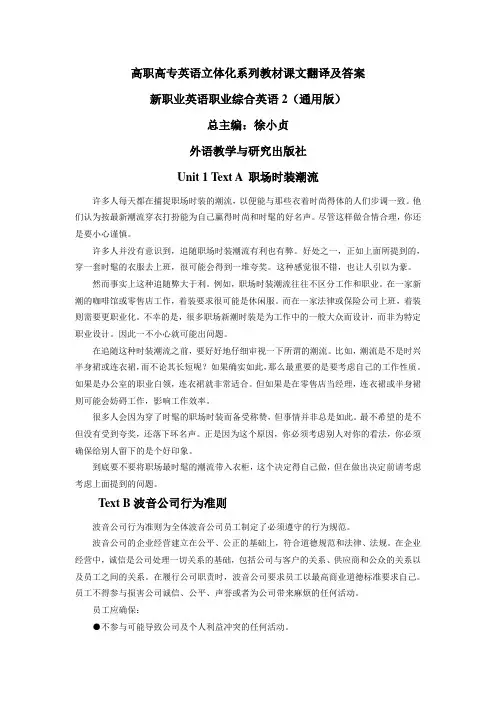
高职高专英语立体化系列教材课文翻译及答案新职业英语职业综合英语2(通用版)总主编:徐小贞外语教学与研究出版社Unit 1 Text A 职场时装潮流许多人每天都在捕捉职场时装的潮流,以便能与那些衣着时尚得体的人们步调一致。
他们认为按最新潮流穿衣打扮能为自己赢得时尚和时髦的好名声。
尽管这样做合情合理,你还是要小心谨慎。
许多人并没有意识到,追随职场时装潮流有利也有弊。
好处之一,正如上面所提到的,穿一套时髦的衣服去上班,很可能会得到一堆夸奖。
这种感觉很不错,也让人引以为豪。
然而事实上这种追随弊大于利。
例如,职场时装潮流往往不区分工作和职业。
在一家新潮的咖啡馆或零售店工作,着装要求很可能是休闲服。
而在一家法律或保险公司上班,着装则需要更职业化。
不幸的是,很多职场新潮时装是为工作中的一般大众而设计,而非为特定职业设计。
因此一不小心就可能出问题。
在追随这种时装潮流之前,要好好地仔细审视一下所谓的潮流。
比如,潮流是不是时兴半身裙或连衣裙,而不论其长短呢?如果确实如此,那么最重要的是要考虑自己的工作性质。
如果是办公室的职业白领,连衣裙就非常适合。
但如果是在零售店当经理,连衣裙或半身裙则可能会妨碍工作,影响工作效率。
很多人会因为穿了时髦的职场时装而备受称赞,但事情并非总是如此。
最不希望的是不但没有受到夸奖,还落下坏名声。
正是因为这个原因,你必须考虑别人对你的看法,你必须确保给别人留下的是个好印象。
到底要不要将职场最时髦的潮流带入衣柜,这个决定得自己做,但在做出决定前请考虑考虑上面提到的问题。
Text B波音公司行为准则波音公司行为准则为全体波音公司员工制定了必须遵守的行为规范。
波音公司的企业经营建立在公平、公正的基础上,符合道德规范和法律、法规。
在企业经营中,诚信是公司处理一切关系的基础,包括公司与客户的关系、供应商和公众的关系以及员工之间的关系。
在履行公司职责时,波音公司要求员工以最高商业道德标准要求自己。
员工不得参与损害公司诚信、公平、声誉或者为公司带来麻烦的任何活动。

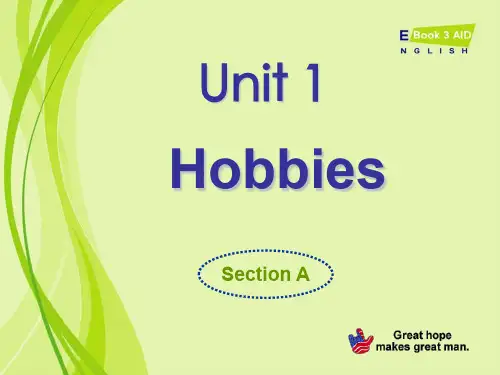
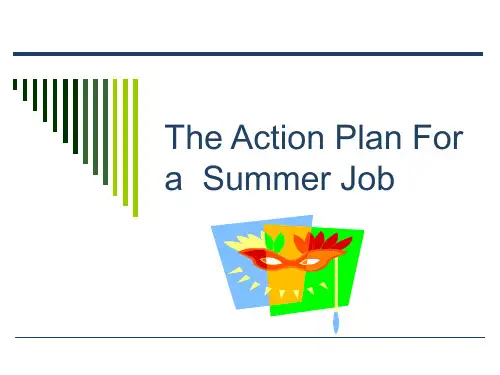
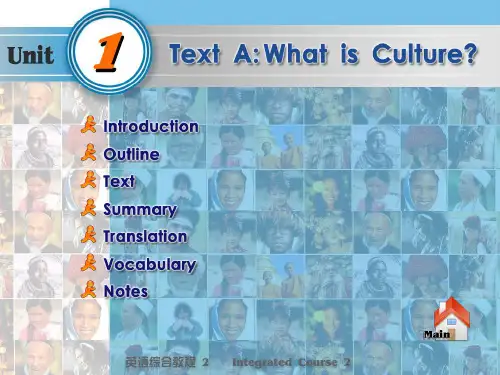
Unit 1 EducationObjectives:After studying this unit, the students are expected to be able to1.grasp the basic ideas or information about Bill Gates and education abroad;2.understand the main idea of text A and master the useful words, sentences structures & phrases ;3.learn the grammar: nouns;4. read, spell and use the new words and phrases in this unit;5. be well-acquainted with the ways of introducing yourself, introducing someone and responding to introduction;6. practice writing: Introducing YourselfFocuses:1. V ocabulary: (omitted)2. Speaking: the importance of education3. Grammar: nouns4. Practical writing: Introducing YourselfMethods:(1) Listening, Speaking and Reading;(2) Discussion;(3) Presentation;(4) Exercises;(5) Writing.Contents:Step 1. Listening and Speaking & Warm-up DiscussionAsk the students to talk about the importance of education;Step 2. Background Information(1) Bill Gates;(2) Education in China;(3) Education Abroad;(4) Related Words: 大学专科:short 2-3-year higher education重点大学:key university注册人数:enrollment希望工程:Project Hope义务教育:compulsory education普及教育:universal education伙食补助:food allowance学分制:the credit system辅导员:assistant for political and ideological work学生会:students‘ union专业课:specialized course必修课:required / compulsory course选修课:elective / optional course奖学金:scholarship专业:major补考:make-up examination系:departmentStep 3. V ocabulary in Text ALead the Ss to read new words and expressions and then read the new words together. Explain the important language points.1.education n.教育e.g. Children in poor areas receive free education.贫困地区的孩子接受免费教育。
Test 1Part I Listening ComprehensionSection A1. Next, please. What’s your trouble?2. What’s your e-mail address?3. What’s the brand of your new mobile phone?4. Are these shoes on sale?5. Could you recommend something special?Section B6. W: Chinese food seems to be less popular than western food with Chinese children. M: I can’t agree with you more.Q: What does the man mean?7. M: Do you love dogs?W: I’m an animal lover.Q: Does the woman love dogs?8. M: Does the rent include the water?W: Yes, but you have to pay for the gas and the electricity.Q: What is the relationship between the two speakers?9. W: Fares, please.M: Three to the railway station.Q: Where does the conversation take place?10. W: I wish I could work as a boss at home.M: You are not daydreaming, I ensure you, Nancy.Q: What can we learn from the dialogue?Section CIn China, some parents expect too much of their children without considering their independence and freedom. These parents see nothing important for their children but high scores. As a result, children are deprived of happiness because they are bound hand and foot by endless homework, numerous exams and boring weekend classes, thus affecting or damaging the relationship between parents and children.Test 2Part I Listening ComprehensionSection A1. Would you like coffee or tea?2. Can I have your QQ number?3. Should we go by train or by air?4. Have you ever won the lottery tickets?5. I really enjoy daydreaming. How about you?Section B6. W: John, Mr. Lee of the ABC Company called you just now.M: Thank you. I’ll give him a call immediately.Q: What will the man do?7. W: Good evening. Can I help you?M: I’d like to try some Chinese spirits. Do you have any suggestion?Q: Where does the conversation most probably take place?8. W: When can I have my own bedroom?M: Why not ask your mummy?Q: What is the most probably relationship between the two speakers?9. M: Excuse me. Can I use your telephone?W: Go ahead, please.Q: What will the man most probably do?10. M: Excuse me, would you please tell me when the next flight to Los Angeles is?W: Sure, the next direct flight to Los Angeles is 2 hours from now.Q: What do we learn from this conversation?Section CA neighborhood is a geographical community located within a larger city or suburb. The residents of a given neighborhood are called neighbors. Traditionally, a neighborhood is small enough that the neighbors are all able to know each other. However in practice, neighbors may not know one another very well at all.Test 3Part I Listening ComprehensionSection A1.How can I get to the railway station?2.Can you buy me a stamp on your way to school?3.What does that thing look like?4.Is it time for class now?5.You speak English quite well.Section B6. W: Please press ten. Thank you.M:You’re welcome. That’s where I’m going too.Q: Where did this conversation most probably take place?7. I want to buy a book on computer programs.W: I’m sorry, sir. That book has been out of print for some time now.Q: What does the woman say about the book?8. M:I thought these disks cost five dollars.W:They used to, but the price has gone up fifty cents.Q:How much do the disks cost now?9.W: If I were you, I’d live in the city instead of going to work by train.M: But the country is so beautiful in spring and fall.Q: Where does the woman prefer to live?10.W: This TV set is getting worse and worse. Now it doesn’t work at all.M: Here’s an advertisement about a big TV sale. There might be something good in it.Q : What does the woman suggest?Section COur body grows most while we are asleep. The tired children usually need more sleep. After we have plenty of rest, we are do our lessons better. Boys and girls about fifteen need nine hours of sleep. If we don’t get enough fresh air, we will feel tired when we wake up. While in bed, we mustn’t cover our head. Our lung need to get enough air, so we’d better open our window at night and let fresh air in. Secentist say that cool air is better than warm air and sleeping in heated rooms does no good to our health.Test 4Part I Listening ComprehensionSection A1.How often do you write a letter to your parents?2.Which of these two books do you think I should take?3.Can you tell me where Tom went?4.How much do you want to spend?5.How about going to the beach?Section B6.M:Do your parents leave at 10 everyday?W:No.They leave at 9 and come back at 4.Q:When do the woman’s parents leave?7. M:Is this 122nd Street?W:No, it is 212nd StreetQ:What address is the man looking for?8. M:What time does the film begin?W:At 8:30. We have ten minutes to get there.Q:What time is it now?9. M:Where are you going during the summer vacation?W:I planned to go to Huangshan, but now I’ve decided to go to Qingdao.Q:Where is the woman going?10. W:I like your black coat, but the white color seems better.M:I don’t think so.Q :What color might the woman like?Section CAristotle divided friendship into two types:the friendship for pleasure and the friendship as a virtue. I think the first type of friendship is not friendship at all. It can only last a short period and when a test comes. The friend will soon come to an end. When your friends are in trouble. You offer them your help. If you help them for no reason, but simply because they are your friends, then you do regard them as what Aristotle said true friends.Test 5Part I Listening ComprehensionSection A1.Don’t forget to turn off the lights when you leave the office.2.Sorry to hear you are ill.3.What a nice-looking hat you have!4.I plan to fly to Shanghai next week, how about you?5.Do you mind if I use your dictionary?Section B6. M: Do you think it’s going to rain? I wander if I need to take an umbrella with me?W: I don’t know. I hope so. It is too hot recently.Q: How is the weather probably like recently?7. M: Excuse me, but which bus goes to the railroad station?W: Sorry, I’m a visitor. Why don’t you ask the boy standing over there?Q: What does the woman suggest?8. M: Have you got any money with me? I have left my wallet in the office.W: Don’t worry. How much do you want?Q: Why does the man borrow money?9. M: I think your house needs cleaning.W: You are right, but I am preparing my thesis defence now. I’ll have to wait till next month.Q: Why doesn’t the woman have her house cleaned?10. M: I can’t find my dictionary. It was right here on the table and now it’s gone. Doyou know where it is?W: Yes, I put it on the shelf.Q: What did the woman do with the dictionary.Section CA dentist is a doctor who cures people of their bad teeth. Dr. William is a children’s dentist. He is always so kind and patient to children. So, children like to go to his office. He tells them about their teeth. He cleans their teeth well. He also takes care of their toothaches and fixes their broken teeth. Then he gives them a present.Test 6Part I Listening ComprehensionSection A6.I really like pop music, How about you?7.What do you think of the play you watched yesterday?8.I want to the ticket to Paris. How much is it?9.Would you please sign your name here first?10.I’m sorry to have forgotten your birthday, Jane.Section B11.W: Good morning, Sir. What can I do for you?M:I’ll come to check my balance of the account. Can you do it for me?Q: Where does the conversation take place?12.M:Wonderful day, isn’t it? Do you want to join us for a walk on the beach?W:I’d love to if you don’t mind waiting me for a while.Q: What will the woman probably do after a while?13.M:How much is the shirt?W:$30 for each, but $ 50 for two.Q: How much will the woman pay for one?14.M:I want to make this parcel to America. What is the postage?W:By ship or by air, sir?Q: Where does the conversation take place?10.W:What would you like to have, sir? Pepper Steak and Smoked Fish are thespecials here.M:Pepper Steak is my favorite. But today I ‘d like Smoked Fish, instead?Q: What does the man prefer today?Section CThere was a serious fire that broke out at the City Hotel. It started at 6:20 p.m on the first floor. There was a lot of smoke coming out and people were standing at the windows and yelling for help. Some people had had burns. Firefighters were rescuing the guests. And ambulances arrived in ten minutes to take the injured to the hospital. The fire had finally been brought under control by 11: 30, but the cause of the fire was still unknown.Test 7Part I Listening ComprehensionSection A1.What time is the next flight to New York ?2.Hi, Tom, How did you like the movie you saw last night?3.Good morning Sir, What can I do for you ?4.How is everything ?5.Happy Birthday to you, Tom !Section B6.M: What would you like, Coke or apple juice?W: I do like both, but I’d rather have some mineral water.Q: What does the woman want to drink ?7.M: My TV set doesn’t work.W: Why not call Mr. Wang ?Q: What does the woman mean ?8.M: Did you see the movie” The Titanic” on TV last night ?W: I would like watch it, but one of my old friends stopped by for a visit, I hadn’t seen her more than 3 years.Q: Why didn’t the woman see the movie last night?9.M: Jane and Mary attend the same school.W: But John says it is he and Mary.Q: What do we know from the conversation?10.M: Hurry up! The meeting begins at eight thirty.W: We still have half an hour to go there.Q: What time is it now ?Section CIn many modern shops and stores the customers serve themselves. They find the goods they want without the help of sales assistants. Big self-service stores of this kind are usually called supermarkets. They sell mainly food and common household items. Most of the goods are stacked on long shelves and their prices are clearly marked. Fruits and vegetables are in one section; meat is in another.Customers load their purchases into special baskets or trolleys and pay for them at one of the cash desks. Supermarkets often price their goods lower than small shops do. Their profit comes from large sales rather than high prices.Test 8Part ⅠListening ComprehensionSection A15.Hello, May I speak to Tom?16.What’s up with Tom ?17.Would you mind closing the door ?18.What’s your mother ?19.You look tired, Would you like to sit here ?Section B6. M: May I smoke here ?W: No, Smoking will do harm to patients.Q: Where do you think the conversation probably take place?7. M: Do you mind if I turn the television off ?W: I’m in the middle of watching a program.Q: What do we learn from the woman’s response?8. M: May I borrow your radio ?W: Yes, If I had one. But I gave my old one to Tom, and I haven’t bought a new one yet.Q: What did the woman say about the radio ?9.M: May I watch what you are doing ?W: Sure. You dig a hole, put in the seed, cover it with earth, and then water it.Q: What’s the woman doing ?10. M: Could I borrow a pen from you ? Mine has just run out of ink.W: I’m afraid I don’t have an extra one. Would a pencil do ?Q: What does the woman mean ?Section CIf you are traveling in a train, the things outside seem to be moving backwards. But, this is not really true. It is the train that is moving.It is the same case with the earth. The sun seems to rise in the east, move across the sky, and set in the west. In other words, the sun seems to travel round the earth. However, this is not really true. It is the earth that is turning. The turning of the earth makes the change from day to night.The earth also travels round the sun on an unchanging path. The path is called an orbit. Just like the earth, there are eight other planets of different size, which all turn round the sun in their own unchanging orbits. The orbits of the earth and other planets are known as the solar system.Test 9Part I Listening ComprehensionSection A1. I’m so glad to meet you here, Cinderella!2. Could you tell Mr. James I’d like to see him, please ?3. Could you finish the paper today ?4. Jones, will you help me move this heavy box?5. I heard you’ve got the job you’ve long desired. Congratulations on it, Peter.Section B6. W: Shall I help you to some roast duck, Mr. Brown?M: No, thanks.Q: What does the woman want to do at first?7. W: I like online shopping. It can save me precious times.M: I can’t agree with you more.Q: What is the man’s attitude towards online shopping?8. M: My god! I’m tired of being jammed in the bus to work every day! I can’t bear that anylonger!W: Why not start your own business?Q: What does the woman suggest the man do?9. W: The long vacation is around the corner, do you have any plan?M: Oh! We’ve already decided to travel around the land by cycling.Q: How dose the man plan to travel?10. W: Daddy, buy me some ice-cream, milk, hamburger and chocolates!M: No problem.Q: What is NOT mentioned in the dialogue?Section CLadies and gentlemen, may I have your attention, please. Flight JB767 from Guangzhou to Xian leaves at five to nine and will arrive at half past eleven this evening. Please get ready for the boarding. Flight TX328 from Chongqing to Guangzhou has to be delayed because of the heavy fog. It will take off at twenty past ten and arrive at least one hour late. Flight HY537 from Guangzhou to Paris leaves at nine thirty and arrives in Twelve hours. That’s all. Thank you for listening.Test 10Part I Listening ComprehensionSection A1. I really enjoy his oil painting. How about you?2. I don’t feel like going to the cinema. Any other idea?3. Tom, why are you so late today?4. Why are you going to Paris ?5. How do you find the new director of our department?Section B6. M: Why not have some spaghetti ?W: I’m sorry. But it doesn’t agree with me.Q: What does the woman mean?7. M: How much should I pay for the machine?W: It used to be $200, but now it has 20% discount.Q: How much should the man pay for the machine now.8. M: Maybe I ought to book the Beijing Weekly. It contains a lot of useful information.W: Why not read it in the library and save money?Q: What is the woman’s advice to the man.9. M: Did you see Tom?W: Yes. He is at the teacher’s office, applying for a student loan.Q: Where is Tom now?10. W: Have you found a new job yet?M: No, I no longer need to do that. I choose to be a freelancer. That suits me better.Q: What can we learn from the dialogue?Section CFriends play a very important part in everyone's life. Friendship usually develops during childhood. New friends are made when you progress through school. Those friends that you make as a student can usually last long. Friends influence your development, maturity(成熟)and sense of responsibility. A familiar expression is“You can tell a lot about a person by knowing who his friends are.”Friendship is based on common interests. If you like sports, most of your friends are likely to be athletic. If you enjoy reading and shopping, most of your friends do the same.Test 11Part I Listening ComprehensionSection A1. Could you get us another room on this floor?2. Shall we meet again to discuss it further?3. How does the new product sell in the market?4. What does Mary look like?5. I want a ticket to Washington. How much is it?Section B6. M: What time does the movie start?W: At 8:30. We have 15 minutes to get there.Q: What time is it now?7. M: May I have a look at that black jacket, please?W: Yes, what size do you take?Q: Where does this conversation most probably take place?8. M: I want to mail this box to New York.W: By ship or by air, sir?Q: Where is the man?9. M: How many students took part in the competition?W: About 20, but only 4 got the prize.Q: How many students got the prize?10. M: May I speak to Jason Daniel, please?W: Sorry. Nobody by that name works here.Q: What can we learn from the woman's words?Section CSome manages have noticed recently that the employees in the company are taking advantage of the policy of having breaks. The workers have two 15-minute breaks per day. However, the two breaks are lasting as long as 25 to 30 minutes each. The workers complain that the factory work is so boring that they need longer breaks. Also the dining hall is so far away that it takes too long to walk there and back. But the company is losing hundreds of work hours each year. Should employees be paid for the time they are not working? The general manager has to call a meeting to discuss this matter.Test 12Part I Listening ComprehensionSection A1. Professor Smith, may I ask you a few questions?2. Did you enjoy the performance last night?3. Do you mind if I turn on the TV?4. Why don’t we go and have a cup of tea?5. My daughter doesn’t like black. What other colors does it have?Section B6. M: I prefer coffee to tea. What about you, Jane?W: Just water.Q: What would the woman like to have?7. M: Don't you usually drive to work?W: No, I walk to work every day.Q: How does the woman usually go to work?8. W: Excuse me. Can you call a taxi for me?M: Sorry, the telephone is out of order.Q: What does the man mean?9. W:Can I help you, sir?M:A deep-fired chicken and a salad, please.Q:Where is the talk possibly take place?10.W:Jim,whatdo you think of your first day in the campus?M:Everyone helped me and I felt great.Q :How did the man feel about his first day in the campus?Section CRecently, a well-known man said that teaching one's wife to drive a car was a difficult job. He said it was the worst job he could think of. However, no one has pointed out that women cause fewer accidents than men do. We hear hundreds of suggestions for reducing the number of road accidents, but men are so unwilling to admit that women drivers are more careful than men. If more women and fewer men were allowed to drive cars, the number of deaths on the roads would soon go down.。